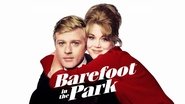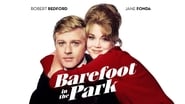Emil Bakkum
The film Barefoot in the park interests me, because it describes a love affair, and because it has been recorded during the flourishing period of the counter culture movement. It is a time of rapid changes in the social position of women and in the (pre-)sexual habits. Lovers start calling Dr. Ruth. Indeed the film gives a sparking display of the new lifestyle, although the couple has just effected a traditional marriage. Apparently the institution still has a nice ring to it. The male character is rather boring, even in his profession (lawyer). He uses his personality for birth control. On the other hand, the female character certainly has the attitude of a hippie. And what else can you expect from Jane Fonda? Corie (Fonda) loves to break through conventions, rules and authority. Her favorite T-shirt is offensive in 19 states. Thus it is evident from the start that this marriage is forged in hell. Already in the second week Corie complains: "There are doers and watchers", and she is the doer of the two. She realizes her mistake, and wants a divorce. This would indeed have been the logical end, were it not that the narrative is supposed to be a comedy. Therefore her mother convinces her that in a good marriage both partners must give up some parts of their personality. They must support each other. Now Corie comes to the conclusion that she actually wants a sterling and caring husband, that is to say, a watcher. The marriage is saved. In its joyous end the film turns back to the spirit of the gay and conservative fifties, in the days before Doris Day was a virgin. The same can be said about the music, which is still classic. Electric guitar players are meant to deliver pizzas. The film is a recast of a theatrical play, and the melodrama is kept intact. The original theater script is also visible in the lack of dynamics in time and space, and the location of most scenes in just a few rooms. In conclusion, Barefoot is an amusing but not deep pastime (at least, I do not see it). It hovers somewhere between conservatism and revolution. If you ate pasta and antipasto, would you still be hungry?
pyrocitor
"I've never seen a young couple so in love," Mildren Natwick fondly croons near the climax of Gene Saks' adaptation of Neil Simon's smash Broadway hit, but by that point in the film we're wary enough to know better. Of course, it's second nature that a drama about a couple happily in love sustaining a functional relationship would never make for thrilling viewing (more's the pity…), but Simon is canny enough to dig a notch deeper than the average relationship yarn, and interrogate why we invest so heavily in the wish fulfillment of successful resolutions to seemingly irreconcilable relationship drama. As such, Barefoot in the Park proves a lighthearted but provocatively probing two-hander, a less urbane Breakfast at Tiffany's or a less acerbic Who's Afraid of Virginia Woolf? if you will – less iconic than both, but sharp and sprightly enough to not be unworthy of the comparison. Saks manages to keep his finger on the uniquely liminal state of late 1960s cinema, counterbalancing the more youth-driven, The Graduate-era risqué with a lighter, more Blake Edwards playfulness (I did a double-take at the Mickey Mouse-ing soundtrack on the recurring 'six flights of stairs' gag to ensure I wasn't watching The Party). It helps that Simon's airtight script keeps things ticking along at a jaunty pace, and the mischievous sitcom-esq scenarios which unfold are arguably more endearing and amusing than those of The Odd Couple. Interestingly, although Barefoot in the Park is billed as a comedy, in spite of in spite of Simon's plentiful zingers and the sparkling performances of Jane Fonda and Robert Redford, the proceedings become increasingly bittersweet, as hindsight lends the perspective of how incompatible their relationship is (it's poignant that Simon wrote the play retroactively based on the dissolution of his first marriage). As such, the closing inevitable romantic reconciliation and 'marriage means compromise' theme don't sit as well as the average happy ending, as it feels like we've been privy enough to the misfiring mechanics of the couple's relationship to let them get off that easy. If anything, this potentially unsatisfactory resolution, which likely played better on the page, may be testament to the leading actors being almost too good at their parts. The character of Paul, meant to play as dull and repressed, is made almost too likable through the luminescent charisma of Redford, perfectly deadpan snappy delivery and hysterical comedy drunk stylings and all, to not feel like the invariable 'good guy' in the scenario, which threatens to skew the relationship balance and defeat Simon's point. Likewise, Fonda embodies the fun-loving, carefree Corrie with such phenomenal gusto that it's difficult to not find her character quirks play as somewhat overwhelming rather than endearing, or for her second act hysterical drunken meltdown to not play as distressingly, wantonly self-absorbed. It's poignant that we, the audience, are given access to Corrie privately, at her most grounded, where her fears and neuroses are teased out in more sympathetic depth, whereas Redford's Paul only sees her at her most manic and performative – an essentially nuanced, clever ploy of characterization. Ultimately, in the end, Simon's objective is not celebrating Corrie and Paul's inevitable reunion (although Fonda and Redford play the heartwarming, troubled heart out of it) as much as understanding how such problematically imbalanced relationships can be and frequently are pushed to persist, sometimes at the detriment of those involved. Paul's "even when I didn't like you I loved you" quip is poignantly on the nose, and helps redirect audience expectations of fairy tale-style romantic closure to appreciating the moments of joy that come along the way, even if sadly foreshadowing future problems or an invariable eclipse. Will they make it in the end? It's hard to see, even hard to endorse. But, deep down, do we want them to? Yes, gosh darn it, we do, just as they do, warts and all. And maybe – hopefully – that's enough. If anything, the film's most pleasant twist is its treatment of Mildred Natwick, Corrie's mother. Introduced as if the set up for a one-note nattery, conservative old crone of a character, Natwick defies stereotypical expectations, surprisingly as a dryly 'with it' woman with a world-weary sense of humour and adventure alike. Similarly, Charles Boyer, as Paul and Corrie's eccentric, mischievous, and ambiguously lusty squatting attic neighbour, wins many laughs, but equally surprises with a deceptively complex and human character amidst his wild antics. If anything, Saks' film is more sympathetic towards romance in the winter years, suggesting the surest way of guaranteeing a functioning relationship is to approach one with the hindsight of a lifetime of pain and mistakes. It's hard not to take to the madcap silliness yet odd dignity of their impromptu pairing, and Natwick and Boyer are both hilarious and lovable in embodying it. Barefoot in the Park isn't perfect, and definitely loses some of its oompf with age, and the onset of other, equally or more nuanced romantic comedies and dramas alike. Nonetheless, Simon's classic remains a pleasantly twinkling, smartly scripted, and on-point dissection of a passionate yet fundamentally flawed relationship, and Fonda and Reford, amidst the stair gags, snowflakes through the skylight, and drunken, Albanian restaurant hijinx, are exceptionally human as its leading duo. Nearly 50 years on, it's still worth throwing caution to the winds and romping barefoot through the freezing grass with them – even if you've got court in the morning. -8/10
edwagreen
Inane farce where conventional attorney weds a quirky young lady, certainly a free spirit if ever there were. Robert Redford and Jane Fonda are perfect in their respective leads, but the writing becomes foolish, and the film goes downhill rapidly with the appearance of tenant Charles Boyer, who Fonda tries to set up with her mother, Ethel Banks, played by Oscar nominee Mildred Natwick. Natwick is suited for the part, but Mabel Albertson, who plays her sister, is reduced to one scene and I feel that Albertson should have had Natwick's part instead.We see elements of the problems of urban living, as well as an interesting performance by a young Herb Edelman as a telephone repair person. We also see role reversals when Redford, as Paul, becomes intoxicated and Fonda assumes conventionalism in order to rescue him.






